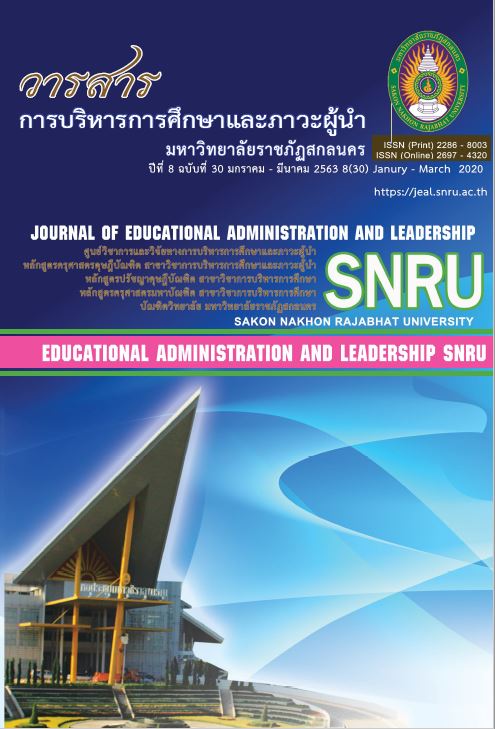

การบริหารงานตามหลักธรรมาภิบาลที่ส่งผลต่อประสิทธิผลการบริหารงานในโรงเรียน สังกัดสำนักงานเขตพื้นที่การศึกษาประถมศึกษามุกดาหาร
Good Governance Based Administration Affecting Administrative Effectiveness of Schools under the Office of Mukdahan Primary Educational Service Area
ผู้แต่ง
ขจรศักดิ์ ว่องไว, เพลินพิศ ธรรมรัตน์, ระภีพรรณ ร้อยพิลา
Author
Kajohnsak Wongwai, Ploenpit Thummarat, Rapeepan Roypila
บทคัดย่อ
การวิจัยครั้งนี้มีจุดมุ่งหมายเพื่อศึกษาเปรียบเทียบ หาความสัมพันธ์และอำนาจพยากรณ์ ระหว่างการบริหารงานตามหลักธรรมาภิบาลและประสิทธิผลการบริหารในโรงเรียน สังกัดสำนักงานเขตพื้นที่การศึกษาประถมศึกษามุกดาหาร และหาแนวทางพัฒนาการบริหารงานตามหลักธรรมาภิบาล กลุ่มตัวอย่างที่ใช้ในการวิจัยในครั้งนี้ คือ ผู้บริหารโรงเรียนและครูผู้สอน ปีการศึกษา 2561 จำนวน 301 คน แบ่งออกเป็น ผู้บริหารโรงเรียน 111 คน และครูผู้สอน 190 คน เครื่องมือที่ใช้ในการเก็บรวบรวมข้อมูลในครั้งนี้ เป็นมาตราส่วนประมาณค่า 5 ระดับ มีค่าอำนาจจำแนก (r) อยู่ระหว่าง 0.72 – 0.92 และค่าความเชื่อมั่นเท่ากับ 0.97 สถิติที่ใช้ในการวิเคราะห์ข้อมูล ได้แก่ ค่าร้อยละ ค่าคะแนนเฉลี่ย ค่าเบี่ยงเบนมาตรฐาน และการวิเคราะห์ความแปรปรวนแบบทางเดียว (One – way ANOVA) การวิเคราะห์สหสัมพันธ์อย่างง่ายของเพียร์สัน (Pearson’s Product Moment Correlation) และการวิเคราะห์การถดถอยพหุคูณ (Stepwise Multiple Regression Analysis)
ผลการวิจัย พบว่า
1. การบริหารงานตามหลักธรรมาภิบาล และประสิทธิผลการบริหารงานในโรงเรียน สังกัดสำนักงานเขตพื้นที่การศึกษาประถมศึกษามุกดาหาร ตามความคิดเห็นของผู้บริหารโรงเรียน และครูผู้สอน อยู่ในระดับมาก
2. การบริหารงานตามหลักธรรมาภิบาลในโรงเรียน สังกัดสำนักงานเขตพื้นที่การศึกษาประถมศึกษามุกดาหาร ตามความคิดเห็นของผู้บริหารโรงเรียน และครูผู้สอน จำแนกตามสถานภาพ ขนาดของโรงเรียน และประสบการณ์ในการปฏิบัติงาน พบว่า มีความคิดเห็นไม่แตกต่างกัน
3. ประสิทธิผลการบริหารงานในโรงเรียน สังกัดสำนักงานเขตพื้นที่การศึกษาประถมศึกษามุกดาหาร ตามความคิดเห็นของผู้บริหารโรงเรียน และครูผู้สอน จำแนกตามสถานภาพ ขนาดของโรงเรียน และประสบการณ์ในการปฏิบัติงาน พบว่า มีความคิดเห็นไม่แตกต่างกัน
4. การบริหารงานตามหลักธรรมาภิบาลกับประสิทธิผลการบริหารงานในโรงเรียน สังกัดสำนักงานเขตพื้นที่การศึกษาประถมศึกษามุกดาหาร ตามความคิดเห็นของผู้บริหารโรงเรียน และครูผู้สอน มีความสัมพันธ์กันในทางบวก อย่างมีนัยสำคัญทางสถิติที่ระดับ .01
5. การบริหารงานตามหลักธรรมาภิบาล หลักการกระจายอำนาจ หลักภาระรับผิดชอบ หลักความเสมอภาค หลักการมีส่วนร่วม หลักการตอบสนอง หลักมุ่งเน้นฉันทามติ หลักประสิทธิผล หลักนิติธรรม และหลักความโปร่งใส มีอำนาจพยากรณ์ประสิทธิผลการบริหารงานในโรงเรียน อย่างมีนัยสำคัญทางสถิติที่ระดับ .05 และ .01
6. การวิจัยครั้งนี้ได้นำเสนอแนวทางการพัฒนาการบริหารงานตามหลักธรรมาภิบาล หลักการกระจายอำนาจ หลักภาระรับผิดชอบ หลักความเสมอภาค หลักการมีส่วนร่วม หลักการตอบสนอง หลักมุ่งเน้นฉันทามติ หลักประสิทธิผล หลักนิติธรรม และหลักความโปร่งใส ไว้ด้วย
Abstract
The purposes of this research were to: examine, compare, determine the relationship and the predictive power between good governance-based administration and administrative effectiveness of schools under the Office of Mukdahan Primary Educational Service Area, and establish the guidelines for developing good governance-based administration. The samples consisted of 111 school administrators and 190 teachers, yielding a total of 301 participants in the 2018 academic year. The instrument for data collection was a set of 5 – level rating scale questionnaires with the discrimination power ranging between 0.72 – 0.92 and the reliability of 0.97. The statistics for data analysis were mean, standard deviation, t – test (Independent Samples), F – test (One – way ANOVA), Pearson’s Product-Moment Correlation Coefficient, and Stepwise Multiple Regression Analysis.
The findings were as follows:
1. Good governance-based administration and school administrative effectiveness, as perceived by school administrators and teachers, were at a high level.
2. Good governance-based administration in schools, as perceived by school administrators and teachers classified by position attained, school sizes, and work experience, was not different.
3. School administrative effectiveness, as perceived by school administrators and teachers classified by position attained, school sizes, and work experience, was not different.
4. Good governance-based administration and school administrative effectiveness as perceived by school administrators and teachers had a positive relationship at the .01 statistical significance level.
5. Good governance-based administration involved the following principles: Decentralization, accountability, equity, participation, responsiveness, consensus orientation, efficiency, rule of law, and transparency, which had a predictive power on school administrative effectiveness at .05 to .01 levels of statistical significance.
6. The purposed guidelines for developing good governance-based administration, including the following principles: decentralization, accountability, equity, participation, responsiveness, consensus orientation, efficiency, rule of law, and transparency.
คำสำคัญ
การบริหารตามหลักธรรมาภิบาล, ประสิทธิผลการบริหารงานในโรงเรียนKeyword
Good Governance Based Administration, School Administrative EffectivenessNotice: Undefined variable: dataSet in /var/www/html/ArticleView.php on line 116
Notice: Trying to access array offset on value of type null in /var/www/html/ArticleView.php on line 116
บทความทุกบทความเป็นลิขสิทธิ์ของ
Notice: Undefined variable: dataSet in /var/www/html/ArticleView.php on line 116
Notice: Trying to access array offset on value of type null in /var/www/html/ArticleView.php on line 116
เท่านั้น
กำลังออนไลน์: 42
วันนี้: 117
เมื่อวานนี้: 2,268
จำนวนครั้งการเข้าชม: 1,251,930
อาคารบัณฑิตวิทยาลัย ชั้น 2 ตำบลธาตุเชิงชุม อำเภอเมือง จังหวัดสกลนคร 47000
โทร/
แฟกซ์ 0-4297-0093
บรรณาธิการ: รองศาสตราจารย์ ดร.ไชยา ภาวะบุตร
ติดต่อ/สอบถาม: นายธีรเวทย์ เพียรธัญญกรณ์
โทร: 0-4297-0093